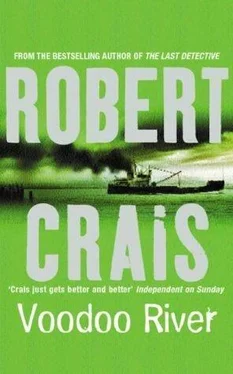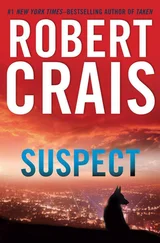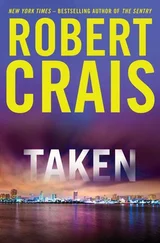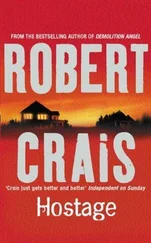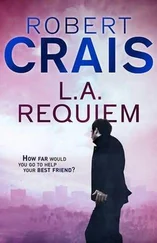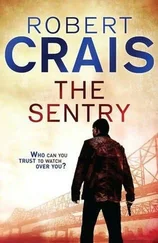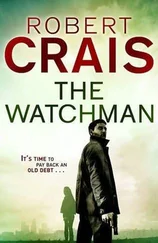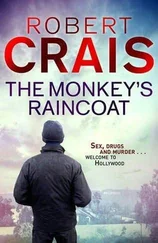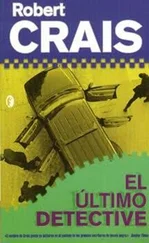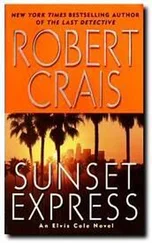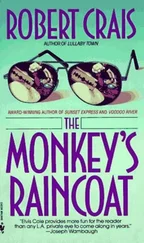The little road narrowed and followed the top of a berm across the marsh, moving in and out of cane thickets and sawgrass and cattails, occasionally crossing other little gravel roads even more overgrown. We had gone maybe half a mile when a wide waterway appeared on the left, its banks overgrown but precise and straight and clearly manmade. I said, "Looks like an industrial canal."
Pike said, "They turn and head back on us, we've got a problem."
"Yeah." When we came to the next crossing road, we stopped and backed off the main road, far enough under the sawgrass to hide the car, then went on at a jog. Once we were out of the car we could hear the rain slapping the grass and the water with the steady sound of frying bacon. We followed the little road for maybe another quarter mile and then an enormous, corrugated tin building bathed in light rose up from the swamp like some incredible lost city. It stood on the edge of the canal, a huge metal shed, maybe three stories tall, lit with industrial floodlamps powered by a diesel generator. Rusted pipes ran in and out of the building, and some of the corrugated metal panels were hanging askew. The isolation and the technology lent a creepy air to the place, as if we had stumbled upon an abandoned government installation, once forbidden and now best forgotten.
The Polara and the Cadillac were at the foot of the building, along with a couple of two-and-a-half-ton trucks. Both of the trucks were idling, their exhausts breathing white plumes into the damp air like waiting beasts. Pike and I slipped off the road and into the sawgrass. I said, "Pod people."
Pike looked at me.
"It's like the nursery Kevin McCarthy discovers in Invasion of the Body Snatchers . The one where the pod people are growing more pods and loading them onto trucks to be shipped all over the country."
Pike shook his head and turned back to the building. "You're something."
A huge, hangarlike door was set into the side of the building. Three guys in rain parkas climbed out of the trucks, opened it, then climbed back into the trucks, and drove them inside. A couple of minutes later, the steady burping of a diesel grew out of the rain and a towboat came up the canal, running without lights and pushing a small barge. It reduced speed maybe a hundred meters from the mouth of the big shed, and the Hispanic guy walked to the water's edge and waved a red lantern. The towboat revved its engines, then came forward under power and slipped inside the building. LeRoy and René and the guy from the Cadillac hurried in after it. Pike and I skirted the edge of the lighted area until we could see through the truck door. I had thought that we'd see people loading bales of marijuana onto the barge or maybe forklifting huge bricks of cocaine off the barge, but we didn't. Inside, maybe three dozen people were climbing off the towboat and into the trucks. Many of them looked scruffy, but not all. Many of them were well dressed, but not all. Most of them were Hispanic, but two were black, three were white, and maybe half a dozen were Asian. All of them looked tired and ill and frightened, and all of them were carrying suitcases and duffel bags and things of a personal nature. Pike said, "Sonofabitch. It's people."
When the trucks were full, the guys in the parkas pulled down canvas flaps to hide their cargo, climbed back into the cabs, pulled out of the building, and drove away into the rain. When the trucks were gone, a couple of hard-looking guys came up out of the barge dragging a skinny old man and carrying something that looked like a rag doll. The old man was crying and pulling at the hard guys, but they didn't pay a lot of attention to him. The old guy went over to the guy from the Eldorado with a lot of hand-waving, and then fell to the ground, pulling at the Eldorado's legs. The guy from the Eldorado kicked at the old man, then pulled out a small revolver, put it to the old man's head, and we heard a single, small pop .
My breath caught and I felt Pike tense.
The guy from the Eldo kicked the old man's body away, then said something to LeRoy Bennett, and Bennett nodded. The guys from the towboat climbed back aboard, and LeRoy and the guy with the gun walked out to the Eldo. The shooter opened the Eldo's trunk, took out a small handbag, and gave it to LeRoy. LeRoy brought it to his Polara. The towboat's engines revved, it backed from the shed, spun slowly into the canal, then eased back the way it had come, still without lights, the low gurgle of its engines fading into the mist. The shooter got into his Eldo and followed after the trucks. Now there were only four of us.
Pike said, "Too late for the old man. What do you want to do?"
"Let's see what happens."
LeRoy took a shovel from the Polara, then he and René dragged the old man and the rag doll along a little trail into the weeds. Pike and I crept after them, moving closer. René dug a small depression in the wet earth, dumped in the bodies, covered them, then went back to their car. LeRoy turned off the generator, and the swamp was suddenly dark. He and René got into their car, and then they, too, were gone.
I said, "Okay."
Pike and I moved to the shallow grave and pushed the mud away with our hands and found the old man and a little girl. The girl was maybe five. She was small and thin, and perhaps she might have been ill, but maybe not. Her face was dark with the rich earth, but as the rain kissed her skin the dirt washed away. I stroked her hair and felt my breath slow and the muscles along my neck and back and across my ribs tighten. She might have been the old man's granddaughter, but maybe not. Maybe she was alone, and he had befriended her. Maybe he just cared, and in the caring expressed his outrage at her death, and for his outrage he'd been killed. We went through his pockets hoping for some sort of identification, but there was none. There was only a small photograph, bent and water-stained, of the man and a group of people who may have been his family. The man was smiling. I put the photograph in my pocket. I said, "Let's get them out of here."
Pike touched my arm. "We can't, Elvis."
I looked at him.
"If we move them, Rossier will know. We have to wait. We have to know more before we help them."
I breathed deep in the wet air, and then I nodded. I didn't like it, but there you are.
We sat in the rain with the old man and the little girl, and after a while we left.
W e returned to the motel at a little before two the next morning, driving slowly along roads that were glassy with rain, through a town so still that it seemed as lifeless and empty as the bodies we'd left in the mud and the sawgrass. We were all that moved in Ville Platte, Joe and I, neither of us speaking, lit only by flashing yellow signal lights that whispered caution.
We showered and changed, Joe going first, and when we were done and the lights were out, I said, "Joe?"
I heard him move on the floor, but it took him several seconds to answer. "Yes."
"Oh, Jesus, Joe."
Pike might have slept, but I did not. I was in the dry room, yet not. I was with the old man and the girl, yet not. I crouched in the sawgrass beside them, the night air dank and muggy, the rain running out of my hair and down my back, the great fat drops falling on the faces below me, washing circles of perfect clarity on the muddy skin, but a clarity that did not maintain and soon faded, obscured by more drops, as if every new truth clouded an old.
The rain stopped falling a few minutes after four, and at 7:05 we called Lucy at her home and told her what we had seen. She said, "Do you think these people were illegal aliens?"
"We counted thirty-five people climbing onto the trucks, but there could've been more. A few Asians, a few whites and blacks, but the majority were Hispanics." I told her about the old man and the girl.
Читать дальше
